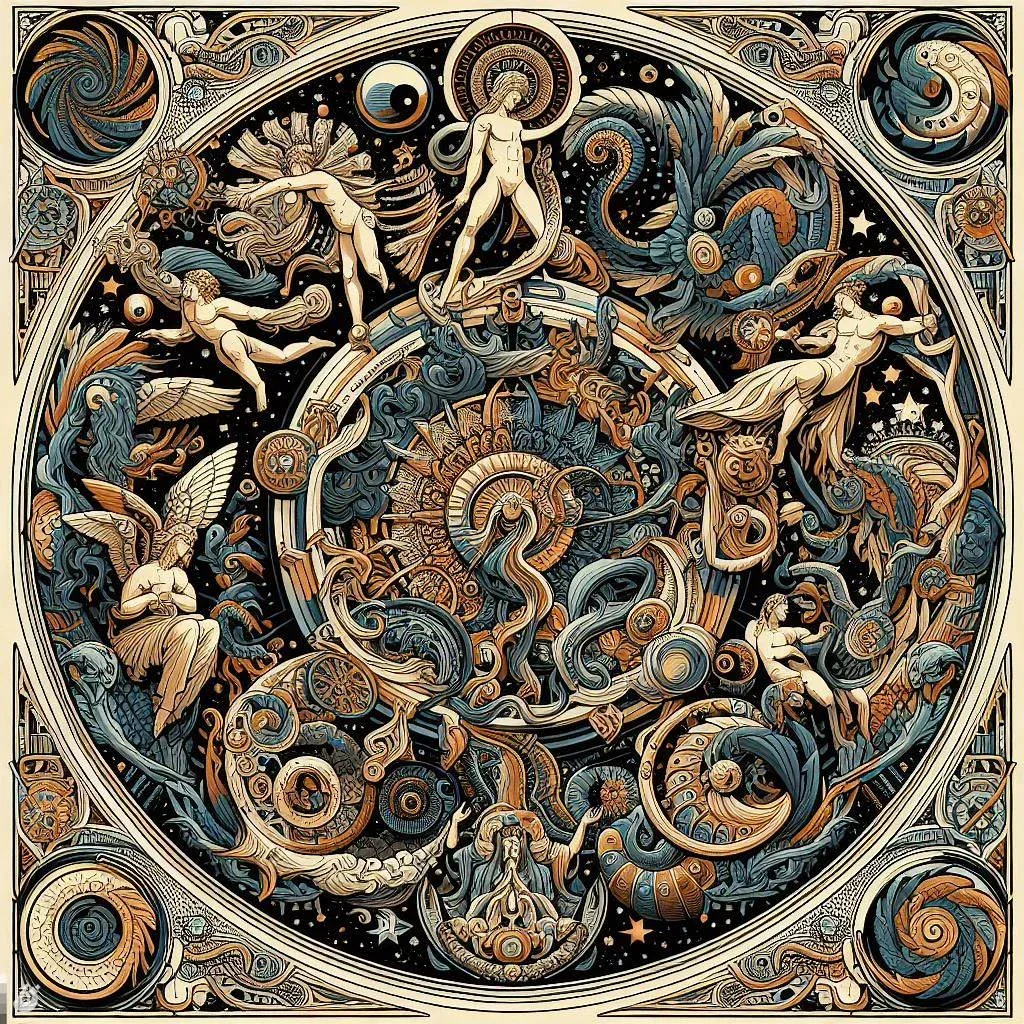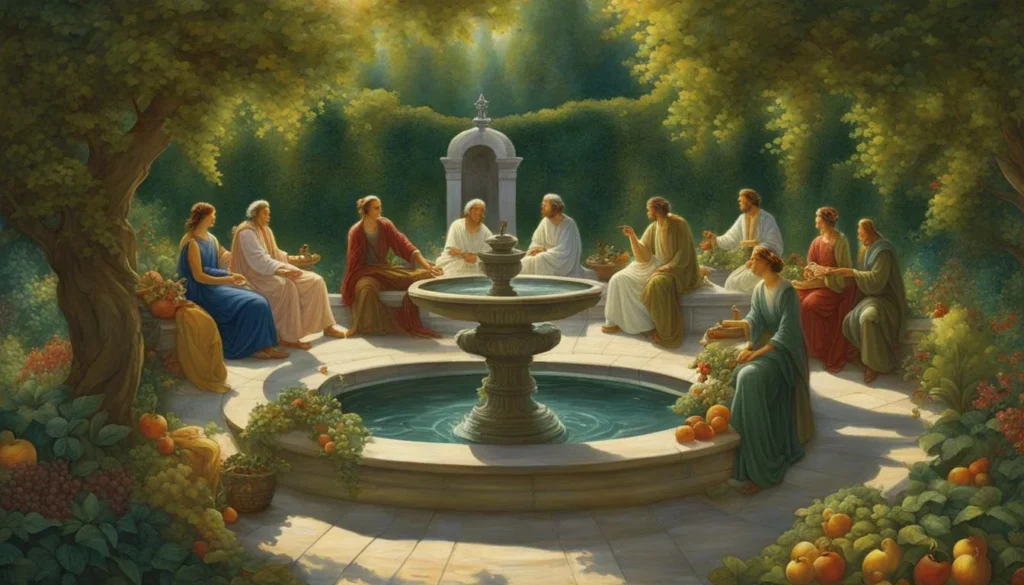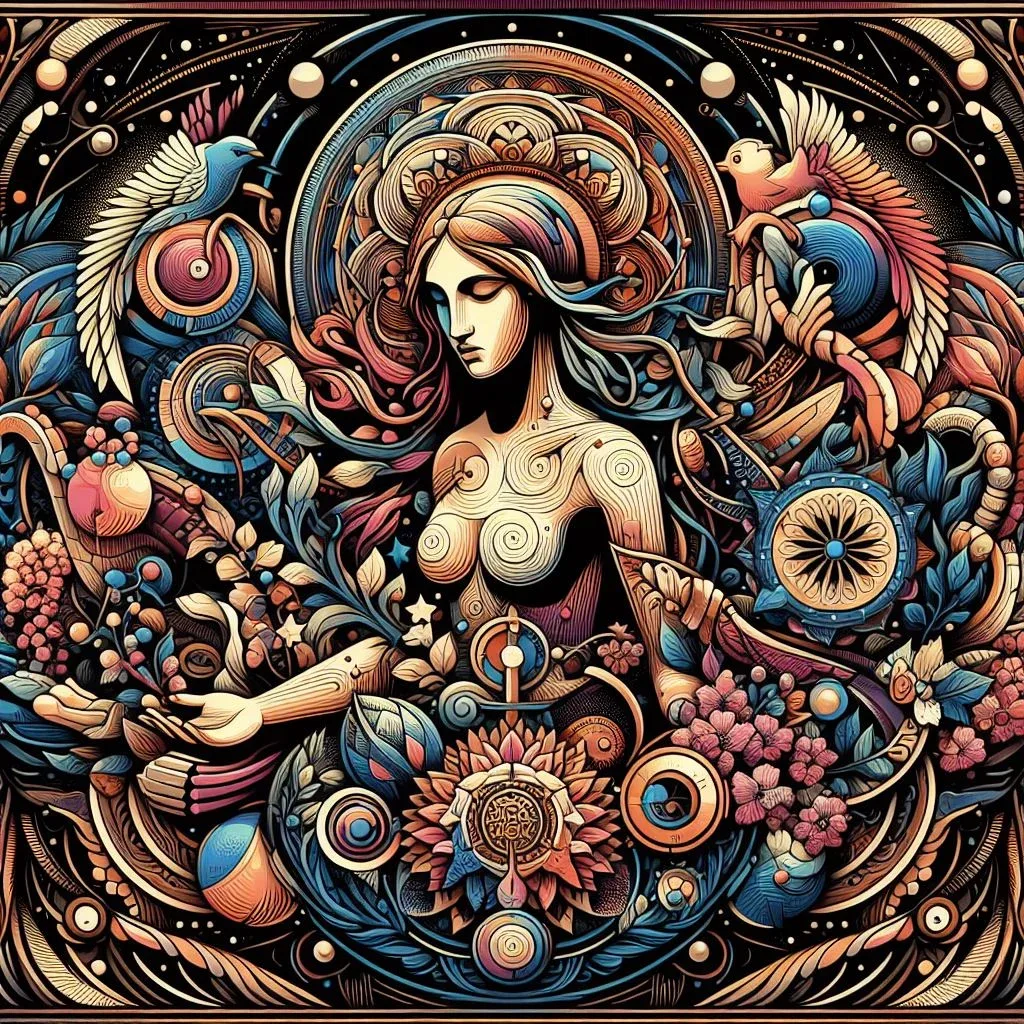O Epicureanism is an ancient Greek philosophy that seeks happiness and pleasure through moderation. You symbols of epicureanism represent fundamental concepts of this philosophy, such as the search for simple pleasures, the valorization of friendship and tranquility of the soul. In this article, we will explore the deeper meanings behind the symbols of epicureanism and how they can inspire us in our search for happiness.

Main points covered:
- O Epicureanism It is a philosophy that seeks pleasure and happiness through moderation.
- Os symbols of epicureanism represent concepts such as simple pleasures, friendship e tranquility of the soul.
- The banquet is a symbol of Epicureanism which represents the conscious search for pleasure.
- The garden symbolizes the tranquility and simplicity of life.
- O sunflower represents the search for light, truth and wisdom.
- The bee symbolizes the active search for knowledge and wisdom.
- The broken column represents the fragility of human existence.
Are you curious to know more about the symbols of Epicureanism and how they can guide us in the search for happiness? Continue reading this article to find out more.
Introduction to Epicureanism and its Symbols
Epicureanism is a philosophy that emerged in Ancient Greece, founded by Epicurus. For the Epicureans, happiness consists in seeking moderate pleasures, finding tranquility of the soul and cultivate healthy relationships. The symbols of Epicureanism represent these ideas, such as the search for bodily pleasures moderate, the search for tranquility of the soul, the appreciation of friendship and the simplicity of life. Epicurus He believed that pleasure was the greatest good and the key to a happy and fulfilled life.

In Epicureanism, the pursuit of happiness is intrinsically linked to the bodily pleasures. Epicureans believed that enjoying the pleasures of the body in a moderate and balanced way was essential to achieving tranquility of the soul. This involves savoring food, appreciating physical comfort, and avoiding excess or addiction. A pursuit of pleasure to the right extent is seen as a form of cure for anguish and concerns of life.
Furthermore, friendship plays a fundamental role in Epicureanism. Epicureans believed that good friendships were essential to a full and meaningful life. They valued the company of loyal and constant friends, who provided emotional support, joy and shared pleasures. Friendship was seen as a source of comfort, security and emotional well-being.
| Principles of Epicureanism | Symbols of Epicureanism |
|---|---|
| Seek moderate pleasures | Search for bodily pleasures moderate |
| Find the tranquility of the soul | Search for tranquility of the soul |
| Cultivate healthy relationships | Valuing friendship |
| Simple life |
For philosopher Epicurus, simplicity of life was of utmost importance. He encouraged his followers to live simply, avoiding unnecessary excesses and searches for superfluous luxuries. He believed that moderation and simplicity were key to achieving happiness and avoiding the pain and worries that arise from the pursuit of wealth and power.

In short, Epicureanism values the search for moderate pleasures, tranquility of the soul, friendship and simplicity of life. These concepts are represented by the symbols of Epicureanism and invite us to reflect on how we can find happiness and live a fulfilling life. In the next section, we will explore the Banquet as a symbol of Epicureanism, representing the conscious pursuit of pleasure and fun as fundamental elements for a fulfilling life.
The Banquet: Symbol of the Pursuit of Pleasure and Fun
The banquet is a symbol of Epicureanism that represents the conscious search for pleasure and fun as fundamental elements for a fulfilling life. For epicures, the intellectual pleasure and sensory are important to achieve happiness. The banquet symbolizes the appreciation of simple pleasures of life, such as good food, music and the company of friends. It also represents the absence of pain and suffering, since Epicureans believe that pleasure is directly linked to the absence of pain.
O intellectual pleasure it is valued by Epicureans as an active quest for knowledge and understanding of the world around us. They believe that the pursuit of pleasure Intellectual life leads us to a more fulfilling and meaningful life. Additionally, Epicureans recognize the importance of sensory pleasures, such as enjoying a delicious meal, listening to pleasant music, and appreciating the beauty of nature. These simple pleasures are seen as fundamental to experiencing happiness in everyday life.
By valuing the pursuit of pleasure and fun, the banquet represents the Epicurean philosophy of living in the present and enjoying every moment. Epicureans believe that life is short and uncertain, and therefore we should seek pleasure and fun while we can. This search for pleasure and fun is seen as a path to happiness and as a way to escape the worries and anxieties of everyday life.

Intellectual Pleasure and the Search for Knowledge
O intellectual pleasure It is one of the main characteristics of Epicureanism and a fundamental aspect in the search for well-being and tranquility of the soul. For Epicureans, seeking knowledge and wisdom is essential for a happy and fulfilled life. Through the pursuit of intellectual pleasure, individuals can expand their horizons, develop skills, and better understand the world in which they live.
“Knowledge is the basis for wisdom, and wisdom is essential for pursuit of happiness. "- Epicurus
A epicurean doctrine values the active search for knowledge as a way of enriching the human experience. Epicureans believe that knowledge allows us to better understand the pleasures and pains of life, helps us make wiser decisions, and allows us to appreciate the simple pleasures of everyday life even more.
| Benefits of Pursuing Intellectual Pleasure | Benefits of Active Search for Knowledge |
|---|---|
| Intellectual pleasure stimulates the mind and enriches life | The active search for knowledge allows us to expand our horizons and develop new skills |
| Knowledge allows us to better understand the pleasures and pains of life | Actively seeking knowledge helps us make wiser, more informed decisions |
| Knowledge allows us to appreciate simple pleasures even more | Knowledge allows us to have a broader view of the world and the people around us |
The Garden: A Symbol of Tranquility and Simplicity
The garden is a central symbol in Epicureanism, representing the search for tranquility and simplicity. For epicures, the simple life and everyday pleasures are essential to achieving happiness. The garden symbolizes a haven of peace and serenity, where you can find joy in contemplating nature and spending time with friends. Furthermore, the garden represents the imperturbability, that is, the ability to maintain calm and tranquility amid life's adversities.

“The garden is the perfect symbol to express the principles of epicureanism. In it, we find harmony between man and nature, the stillness that allows us to enjoy the simple pleasures of life and the serenity that accompanies us regardless of external circumstances.”
In the garden, epicures find a space to connect with nature, cultivating a life in harmony with natural cycles. They appreciate the simplicity of flowers, the beauty of landscapes and the feeling of peace that the environment provides. This connection with nature helps restore tranquility to the soul, allowing individuals to experience a pleasurable and meaningful life.
The Valuation of Simple Life and Everyday Pleasures
For epicures, the simple life is fundamental to achieving happiness. They value everyday pleasures, such as enjoying a good meal, chatting with friends, enjoying a sunset or reading a book. These small moments bring joy and satisfaction, making life fuller and more meaningful.
| Main Characteristics of the Garden in Epicureanism | Meanings |
|---|---|
| Tranquility and Serenity | The garden represents a refuge of peace and calm, where individuals find serenity even in the face of life's adversities. |
| Connection with Nature | Through the garden, epicures seek a deep connection with nature, appreciating its beauty and harmony. |
| Simple Life and Pleasures Daily Life | The garden symbolizes the appreciation of simple life and everyday pleasures, which bring joy and satisfaction to our lives. |
| Imperturbability | The garden represents the ability to maintain calm and tranquility even in the face of adversities and turbulence in life. |

Although not a classic symbol of Epicureanism, the sunflower It has been associated with Epicureanism as a metaphor for the search for light, truth and wisdom. As well as the sunflower follows the path of the sun, epicures constantly seek inner enlightenment and a deep understanding of life's simple pleasures. The sunflower represents the aspiration for a full and meaningful life, where the light of truth and wisdom guides the steps towards happiness.

Just as the sunflower turns its face to follow the sun's journey across the sky, Epicureans seek a life of self-discovery and personal growth. The sunflower symbolizes the need to turn within ourselves, seeking the inner light and wisdom that will guide us in our search for happiness.
Just as the sunflower stands out among other fields, Epicureans strive to stand out in the search for truth and wisdom. They are not content with the superficiality of life, but seek a deeper understanding of the simple pleasures and values that give meaning to existence. Just as the sunflower shines brightly in the sun, Epicureans shine through their pursuit of an authentic and meaningful life.
Table: Meanings of Epicurean Symbols
| Symbol | Meaning |
|---|---|
| Sunflower | Search for light, truth and wisdom |
| Garden | Tranquility and simplicity of life |
| Abelha | Search for knowledge and wisdom |
| Banquet | Search for pleasure and fun |
| Broken Column | Fragility of human existence |
| Wheel of Fortune | Ever-changing nature of life |
As we can see, each Epicurean symbol has a deep meaning that inspires us to seek a full and meaningful life. Whether through the search for light and truth like the sunflower, the search for tranquility and simplicity like the garden, or the search for knowledge and wisdom like the bee, the symbols of Epicureanism invite us to reflect on the true meaning of happiness and the guide us in our search for a fuller and more satisfying life.
The Bee: Symbol of the Search for Knowledge and Wisdom
The bee is a symbol of Epicureanism that represents the active search for knowledge and wisdom. Just as bees diligently collect nectar to produce honey, epicures have a desire to seek knowledge and enrich their lives. The bee symbolizes the importance of dedicating ourselves to the search for knowledge and understanding of the world around us. She represents the influence of epicureanism in everyday life and the appreciation of knowledge as a way to achieve happiness and wisdom.

Epicurean philosophers recognized that knowledge is fundamental to a full and satisfying life. For them, the search for knowledge and wisdom it was not an end in itself, but rather a means to achieve a deeper understanding of life's simple pleasures.
“The mind without knowledge is worthless.” – Epicurus
O epicurean thought emphasizes the importance of questioning, learning, and expanding our intellectual horizons. The bee as a symbol reminds us that the search for knowledge must never cease, as it is through knowledge that we can grow, evolve and find true wisdom.
The Broken Back: Meaning of the Fragility of Human Existence
The broken column is a symbol that represents the fragility of human existence No. epicurean thought. Just as a broken column can collapse at any moment, human life is subject to uncertainty and unexpected changes. This symbol reminds us of the importance of appreciating the present moment, cultivating meaningful relationships and seeking happiness in the small joys of life.
In Epicurus' philosophy, the broken column symbolizes the fragile nature of human existence and the need to make the most of every moment. He invites us to reflect on the impermanence of life and the importance of finding joy and satisfaction in simple things. Through this symbol, we are reminded that we should value each day and seek happiness wherever it may be.
“The broken spine reminds us of the importance of appreciating the present moment, cultivating meaningful relationships, and seeking happiness in life’s small joys.”
Valuing the present and the search for happiness
No epicurean thought, the broken column also represents the importance of valuing the present. In a world full of uncertainty, it is essential to appreciate every moment and find happiness in the little things. By recognizing the fragility of human existence, we are encouraged to seek joy and satisfaction in everyday experiences.
Additionally, the broken spine reminds us of the importance of cultivating meaningful relationships. Human bonds are fundamental to happiness and well-being, and we must seize every opportunity to strengthen these connections. By valuing relationships, we can find emotional support, share joy and face life's challenges together.

In short, the broken spine is a powerful symbol that reminds us of the fragility of human existence and the importance of valuing the present. She invites us to seek happiness in the small joys of life and to strengthen the bonds that connect us to others. By understanding the meaning of this symbol in the context of Epicureanism, we can find inspiration to live a full and satisfying life, embracing the uncertainties of the world and finding happiness wherever it may be.
The Wheel of Fortune: Symbolizing the Ever-Changing Nature of Life
A Wheel of Fortune is a symbol that represents the ever-changing nature of life's circumstances. In Epicureanism, understanding this constant mutability is essential to face life's adversities and seek happiness. A Wheel of Fortune symbolizes the idea that life is marked by ups and downs, and that circumstances can change quickly. Epicureans are encouraged to cultivate the ataraxia, the serenity of the soul, even in the face of inevitable changes, always seeking simple pleasures and tranquility.
Just as the Wheel of Fortune turns, our lives also go through different stages and situations. This wheel represents the round of life, which takes us along unpredictable paths, challenging us to find balance and well-being amidst changes. Epicureanism teaches us to find simple pleasures in each turn of the wheel, to enjoy good things and seek tranquility even when we face difficulties.
By understanding the ever-changing nature of life, we can adopt a calmer perspective in the face of uncertainty and challenges. The Wheel of Fortune reminds us that nothing is permanent and that we must find our own inner stability in the midst of external changes. Seek simple pleasures, cultivate ataraxia and practicing tranquility are keys to facing the wheel of life with wisdom and serenity.

The Wheel of Fortune represents the search for internal harmony and the ability to find well-being even in the midst of life's upheavals. By understanding the ever-changing nature of life, we can learn to appreciate each moment and find joy in the simple pleasures of everyday life. Just as the Wheel of Fortune turns, we can also turn with it, finding balance, ataraxia and tranquility in every turn of the round of life.
Understanding the Deeper Meanings Behind the Symbols of Epicureanism
The symbols of Epicureanism have deep meanings linked to Epicurean philosophy and principles. Each symbol offers valuable insights into how to live a full and satisfying life by seeking out the wisdom of Epicureanism and applying it to our own journey in life. pursuit of happiness.
One of the main symbols of Epicureanism is the banquet, which represents the conscious search for pleasure and fun as fundamental elements for a fulfilling life. Epicureans believe that intellectual and sensory pleasure are important to achieve happiness, and the banquet symbolizes the appreciation of the simple pleasures in life, such as good food, music and the company of friends.
The garden is also a central symbol in Epicureanism, representing the search for tranquility and simplicity. For epicures, a simple life and everyday pleasures are essential to achieving happiness. The garden symbolizes a haven of peace and serenity, where you can find joy in contemplating nature and spending time with friends.
Additionally, the sunflower has been associated with Epicureanism as a metaphor for the search for light, truth, and wisdom. Just as the sunflower follows the path of the sun, Epicureans constantly seek inner enlightenment and a deeper understanding of life's simple pleasures.
| Symbol | Meaning |
|---|---|
| Banquet | Conscious search for pleasure and fun |
| Garden | Tranquility and simplicity |
| Sunflower | Search for light, truth and wisdom |
By understanding the deeper meanings behind the symbols of Epicureanism, we are invited to reflect on the meaning of happiness and seek wisdom to live a life full of simple pleasures and achievements.

Conclusion
The symbols of Epicureanism represent fundamental concepts of this philosophy, such as the search for simple pleasures, the appreciation of friendship and tranquility of the soul. Inspired by these symbols, we can seek a full and satisfying life, cultivating meaningful relationships, enjoying the simple pleasures of everyday life and finding inner tranquility.
Epicureanism invites us to reflect on the deeper meaning of happiness and to seek the wisdom that will guide us on this journey. By understanding the meanings behind the symbols of Epicureanism, we can apply these teachings to our own pursuit of happiness, finding pleasure in simple moments and valuing the importance of personal relationships.
Ultimately, Epicureanism teaches us that happiness is within our reach when we seek simplicity, gratitude, and inner peace. Through the symbols of Epicureanism, we are invited to appreciate life to its fullest, find joy in simple pleasures, and cultivate a peaceful mind. May these symbols inspire us to live a life filled with happiness, simple pleasures and achievements.
FAQ
Q: What are the symbols of Epicureanism?
A: Symbols of Epicureanism include the banquet, the garden, the sunflower, the bee, the broken column, and the Wheel of Fortune.
Q: What does the banquet symbolize in Epicureanism?
A: The banquet symbolizes the conscious search for pleasure and fun as fundamental elements for a fulfilling life. It represents the appreciation of the simple pleasures in life and the absence of pain and suffering.
Q: What is the meaning of the garden in Epicureanism?
A: The garden symbolizes the search for tranquility and simplicity. It represents a refuge of peace, serenity and imperturbability, where you can find joy in contemplating nature and spending time with friends.
Q: Is the sunflower a symbol of Epicureanism?
A: Although not a classical symbol, the sunflower is associated with Epicureanism as a metaphor for the search for light, truth and wisdom. It represents the aspiration for a full life, where the light of truth and wisdom guides the steps towards happiness.
Q: What does the bee symbolize in Epicureanism?
A: The bee symbolizes the active search for knowledge and wisdom. It represents the importance of dedicating ourselves to the search for knowledge and understanding of the world around us, valuing knowledge as a way of achieving happiness and wisdom.
Q: What does the broken spine represent in Epicureanism?
A: The broken spine represents the fragility of human existence. It reminds us of the importance of appreciating the present moment, cultivating meaningful relationships, and seeking happiness in life's small joys.
Q: What is the significance of the Wheel of Fortune in Epicureanism?
A: The Wheel of Fortune represents the ever-changing nature of life's circumstances. It symbolizes the idea that life is marked by ups and downs, and that circumstances can change quickly. Epicureans are encouraged to cultivate serenity of the soul, even in the face of inevitable changes.
Q: What do the symbols of Epicureanism mean?
A: The symbols of Epicureanism represent fundamental concepts of this philosophy, such as the search for simple pleasures, the appreciation of friendship, the tranquility of the soul and the understanding of the fragility of human existence. They offer valuable insights into how to live a full and satisfying life.
Q: How can I apply the meanings of Epicurean symbols to my life?
A: By understanding the deeper meanings behind the symbols, you can seek the wisdom of Epicureanism on your own journey toward happiness. Cultivate meaningful relationships, enjoy the simple pleasures of everyday life, and find inner tranquility.
Q: Are the symbols of Epicureanism relevant today?
A: Yes, Epicurean symbols are relevant today. They invite us to reflect on the deeper meaning of happiness in an increasingly tumultuous world, offering valuable guidance for a life full of simple pleasures and fulfillment.





